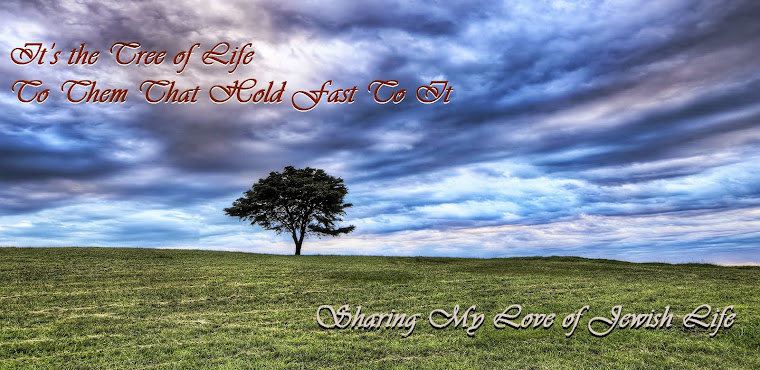The first word of this week’s parsha
“ra’eh,” is often translated into English as the dramatic Behold!
“Behold I put before you-all this day a blessing and a curse” (Devarim 11:26).
Hebrew, alas, does not have such exclamatory terms, and the most basic
translation of this word is the imperative “See!”
See! Look! Behold! This may actually
be one of the most common commands in modern language. Look at this mess!
See the show! Perhaps this is because, for most people, seeing is one of
the most concrete ways of gaining accurate input – together with the sense of
touch. When we can see something, we can begin to feel as if we can understand
it. As they say, “Seeing is believing!”
Ra’eh is an
interesting word, especially if one likes to think of words creatively. For
instance, is there a connection between ra’eh (reish - aleph – hey)
and ro’eh (reish - vav - ayin - hey), which means shepherd?
Perhaps it is that the job of a shepherd is to continually have his flock in
his sights and to be keeping his sight ever-alert for threat or wandering
lambs.
While Moshe might have been the
quintessential shepherd, when he addresses the people in Devarim 11, he is not
asking them to look at something physical and concrete. He is asking them to
see something greater. This too can have a correlation to a play on the root of
the basic verb. The conjugations of liroat are often confused with the
conjugations of lirah, to be in awe of/fear. Lirah is not fear as
in afraid or terrified (pachad) but rather fear in a sense of feeling as
if one is in a situation that is beyond them. In the proper context, it is a
positive attribute, for one is meant to have yiras Hashem, awe/fear of
God. Only when one can see with one’s inner, spiritual eye can one begin to
truly comprehend the significance of yiras Hashem.
“Behold I put before you-all this
day a blessing and a curse.” One can’t technically see a blessing or a curse,
but one can use one’s “inner eye” to perceive how actions lead to situations,
good and bad. Rabbi Shimshon Raphael Hirsch writes: “Ra’eh, see, it is
not on faith and belief in the teachings which you have to accept from others,
but out of everything you yourselves have experience up to now and what has
been recalled to your minds by the retrospective view that you have just been
given, you must have formed your own conviction that God has placed the making
of your future fate most blessed or most accursed entirely in your own hands by
His Torah which He has sent you through Moses.
The use of the imperative is not the
only interesting feature of the word Ra’eh. The verse says:
Ra’eh Behold (singular imperative)
anochi I (in its more formal form)
noten put (literally give)
lifneichem before you all (in the plural second
person form)
hayom this day...
Technically, if Moshe was speaking
to a large crowd, ra’eh should have been ra’u, the plural form.
Moshe, however, was not talking to a crowd. He was talking to Jashub and Elon
and Nemuel and… to each individual Jew who stood ready to enter the Promised
Land. The Kli Yakar, a medieval commentator explains: “’See’ is singular.
‘Before you’ is plural. This is what our Sages teach us: A person must always
view things as if the entire world is half righteous and half wicked. If he
performs a single mitzvah he tips himself and the entire world to the
side of merit. Therefore Moshe spoke to every individual, ‘See’ that he should
see in his thought that every single action affects all of them.
Perhaps “Behold” is the best
translation for the use of ra’eh in Devarim 11. Merriam-Webster defines
the word as “to perceive through sight or apprehension.” Moshe wants the people
to do more than just see. He wants them to behold, to take in and understand
everything that has befallen them, everything that they have been taught and
that they have witnessed, and everything that they think will and can influence
their behaviour.
This level of perception is not
easy. In the “Age of Information” society seems to believe that humanity can
make better decisions because we have all of the facts so easily accessible.
The internet and social media provide all of the facts and all of the opinions,
but obscures the ability of individuals to behold, to take it all in and
reflect. Finding the clarity of mind to really understand the blessing of Torah
and the curse of leaving it behind is incredibly difficult. But it can be done.
Indeed, according to the commentary
of the Ohr Hachayim, inspiration for the ability to choose blessing comes
straight from Moshe and is alluded to in his use of the word Anochi. “Moses had
something else in mind when he said ראה אנכי, "look
at me!" Maimonides explains in his treatise Hilchot Teshuvah chapter 5
that every person has the potential to become the equal of Moses. This is
precisely what Moses meant. He said: "Take a good look at me! Everything
that I have accomplished you are able to accomplish for yourselves!"
Whenever a person aspires to serve the Lord he is not to look at people who
have been under-achievers compared to himself and to use such a comparison in
order to pat himself on the back on his relative accomplishment, but he is to
train his sights on those who have achieved more than he himself and use this
as a challenge to set his spiritual sights ever higher.”
